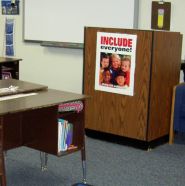The new school year is always a time of transition and change: new pupils, new staff and renewed energy from the summer break. This year sees more change than usual however, as the much discussed SEN reforms are finally upon us and provision has quite dramatically changed.
Following on from earlier newsletters about what the reforms mean for you, here we will discuss one key aspect of the reforms: the person-centred approach to planning and review.
The new guidelines place the child or young person front and centre in their provision, whether it be education or health care. They have a greater voice in terms of what they want to achieve, what they feel helps and supports them, as well as where they want to end up.
This is a move away from the top-down approach that has been the theme of much SEN provision and will mean making changes in systems, policies and procedures. Parents also have a greater say and, as parental engagement is often a challenge for socially excluded young people, this too will pose great challenges.
“This means more work!” we hear you cry. Well, initially yes. However, it is also an opportunity to make the work you do become more collaborative, more effective and much more rewarding for everyone involved. Investment in person-centred planning and review doesn’t just improve the experience of the child or young person; it improves the experience of all the stakeholders.
“Transitioning to person-centred planning and reviews involved investment in time and training for my staff, but the impact on the students has been enormous. It has created a culture where the discussion of targets by students is embedded, rather than a rehearsed quote to trot out for an inspector. I can’t recommend it enough.”
One Page Profiles
One practice that will change will be use of the IEP. In the person-centred approach, this is replaced by what is known as a one page profile – or OPP. This has lots of the same information as an IEP, but is much more user friendly and incorporates information about the child’s abilities rather than focusing on perceived weaknesses.
With headings such as ‘what we like and admire about…” and “what helps me learn”, the information on an OPP stops being about tracking the efficacy of whatever intervention is in place and becomes much more focused on providing up to date and relevant information about the young person.
This is especially relevant when so much of SEN delivery is expected to be covered by good quality ‘first wave’ teaching. IEPs used to live in dusty files, accessed only by the SENCO and maybe a TA if 1:1 support was in place. OPPs are active, used by classroom teachers and students alike and need to be understandable as well as approachable.
The challenge presented is in gathering the information: rather than it coming straight from the statement or SENCO’s own understanding, it is instead a collaborative process between all stakeholders, including the student.
Person-Centred Reviews
The annual review used to be a fairly daunting process for most people. Information was gathered in advance of the meeting and decisions were almost always a formality. The child or young person, and their parents or guardians, were ultimately passive recipients of information and judgement.
Person-centred reviews are much more interactive and allow for genuine collaboration between student, parent or guardian, school and any other agencies involved in the process. They follow the same set of headings that will be on the OPP and stakeholders all have a chance to add their point of view about each topic. They require a certain skill on the part of the SENCO, or whoever chairs the meeting, but when done well can elicit information that enlightens and immensely improves the quality of provision for that young person.
Action points and questions to be answered are recorded as the meeting progresses and the information gathered is directly fed into the OPP, as well as provision planning or even Statements and EHC plans where appropriate.
We are sure your SENCO is on top of all the developments (and hasn’t been found crying in their stockroom just yet). However, another of the key developments in SEN provision is that every teacher really does have to be a teacher of ‘special needs’ . So, as a school leader, the culture of the person-centred approach will need to be fostered throughout the school by you.










